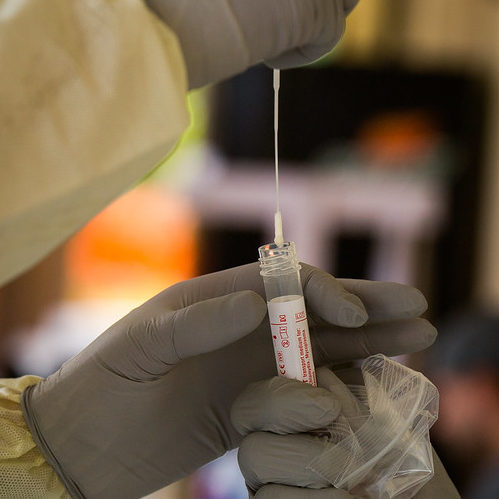Testing Employees for COVID-19: Guidance for Employers

Where the safety of your staff and customers requires it, employers can require employees to be tested for COVID-19 and provide employers the results of testing.
Employers Can Require Employees to be Tested for COVID-19
Employers who want to require employees to be tested for COVID-19 must be aware of their requirements under the Americans with Disability Act (ADA). Title 1 of the ADA applies to all U.S. employees with 15 or more employees.
The ADA requires that any mandatory medical test of employees be “job related and consistent with business necessity.” Applying this standard to the COVID-19 pandemic, employers may take steps to determine if employees entering the workplace have COVID-19 because an individual with the virus will pose a direct threat to the health of others. Therefore an employer may choose to administer COVID-19 testing to employees before they enter the workplace to determine if they have the virus.
Consistent with the ADA standard, employers should ensure that the tests are accurate and reliable. For example, employers may review guidance from the U.S. Food and Drug Administration about what may or may not be considered safe and accurate testing, as well as guidance from CDC or other public health authorities, and check for updates. Employers may wish to consider the incidence of false-positives or false-negatives associated with a particular test. Finally, note that accurate testing only reveals if the virus is currently present; a negative test does not mean the employee will not acquire the virus later.
Based on guidance from medical and public health authorities, employers should still require – to the greatest extent possible – that employees observe infection control practices (such as social distancing, regular handwashing, and other measures) in the workplace to prevent transmission of COVID-19.
Employers Can Require Employees to Disclose COVID-19 Test Results
The ADA requires that all medical information about a particular employee be kept confidential and stored separately from the employee’s personnel file, thus limiting access to this confidential information. An employer may store all medical information related to COVID-19 in existing medical files. This includes an employee’s statement that he has the disease or suspects he has the disease, or the employer’s notes or other documentation from questioning an employee about symptoms.
“Healthcare providers may share patient information with anyone as necessary to prevent or lessen a serious and imminent threat to the health and safety of a person or the public consistent with applicable law and the provider’s standards of ethical conduct.” (OCR Bulletin: HIPAA Privacy and Novel Coronavirus (2/20) at p.4, citing 45 C.F.R. § 164.512(j)).
A provider may disclose information to the employer if the provider has a valid HIPAA-compliant authorization from the employee authorizing the disclosures. (45 C.F.R. § 164.508). Furthermore, if the purpose of the provider’s exam or test was to disclose information to the employer (e.g., a fitness-for-duty exam or a screening test), the provider may condition the test or exam on receipt of the authorization allowing the disclosure to the employer. (45 C.F.R. § 164.508(b)(4)(iii); 65 Fed. Reg. 82516 and 82658). The provider may not condition the treatment or require an authorization if the patient simply sought care for purposes unrelated to a disclosure to the employer. (45 C.F.R. § 164.508(b)(4)).
Health care providers may disclose health screening results directly to an individual’s employer when the service was provided at the employer’s request, and the employer needs the information to comply with legal obligations related to workplace health monitoring. The health care provider must provide the individual with written notice that the information will be disclosed to his employer at the time of the service and must limit the disclosure to the findings regarding the medical surveillance at issue. See 45 CFR 164.512(b)(1)(v).
Do you have questions about managing employees in the time of COVID-19? Contact us at contact@brewerlong.com to schedule a consultation with a beverage attorney.
Because we’re attorneys: This blog post is provided on an “as is” and “as available” basis as of the date of publication. We disclaim any duty to update or correct any information contained in this blog post, including errors, even if we are notified about them. To the fullest extent permitted by law, we disclaim all representations or warranties of any kind, express or implied with respect to the information contained in this blog post, including, but not limited to, warranties of merchantability, fitness for a particular purpose, title, non-infringement, accuracy, completeness, and timeliness. We will not be liable for damages of any kind arising from or in connection with your use of or reliance on this blog post, including, but not limited to, direct, indirect, incidental, consequential, and punitive damages. You agree to use this blog post at your own risk. Regarding your particular circumstances, we recommend that you consult your own legal counsel–hopefully BrewerLong.

